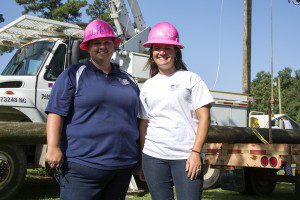 TARBORO ─ Riverside High School science teacher Leigh Ann Hudson often tells her students, “Life begins at the end of your comfort zone.”
TARBORO ─ Riverside High School science teacher Leigh Ann Hudson often tells her students, “Life begins at the end of your comfort zone.”
This summer, Hudson lived her life at the end of her comfort zone as an intern with the Edgecombe-Martin County EMC through the Kenan Fellows Program.
“Being a Kenan Fellow will show my students that I ‘practice what I preach’ when I encourage them to be life-long learners and curious about their environment,” said Hudson, who spent five weeks learning the ins-and-outs of electric cooperatives.
Her mentor, Monica Speight, the communication specialist at Edgecombe-Martin County EMC, arranged her internship so Hudson could explore every department from member services to accounting. Hudson rode with linemen and observed as they repaired an underground line and set new poles for service. She toured a nuclear power plant and a gas peaking plant, visited a solar farm and went to nearly every substation in the service area.
“I learned about every aspect of the science behind electricity and electrical services,” said Hudson, who teaches ninth-grade earth science. “Beyond the flow of electrons, there is so much to consider from how the lines are run to the distribution and consumption.”
Hudson, who is entering her 12th year of teaching, is one of 42 Kenan Fellows who are spending their summer interning in local industries and research facilities. North Carolina’s electric cooperatives and Edgecombe-Martin County EMC supported her fellowship. This is the second year North Carolina’s electric cooperatives have helped to support the Kenan Fellows Program, which is a K-12 STEM education initiative of the Kenan Institute for Engineering, Technology & Science at N.C. State University.
“Leigh Ann has approached her Kenan Fellowship the same way she approaches teaching, with enthusiasm, dedication and commitment to making a difference for her students,” said Speight of Edgecombe-Martin County EMC. “She has become a true partner and team member. We are excited to support her efforts to bring real-world experiences to her students and to help them better understand not only the technical aspects of generating and delivering electricity, but also the co-op’s role in supporting our communities.”
In addition to the internship, Hudson is completing 80 hours of professional development that builds leadership capacity and promotes curricular design linking classwork with “real” work. When she returns to her classroom in the fall, Hudson will use her internship experience to implement lessons that will connect students and their families with the work being done by the EMC. She will use her new knowledge to teach students about career skills and opportunities that will help them succeed.
“This experience has provided me with a broader appreciation of what happens outside of the classroom and I’ll be able to share those experiences and insights with my students,” Hudson said. “Participating in Kenan Fellows has allowed me to bring new and exciting lessons to the classroom for my students.”
About North Carolina Electric Cooperatives: North Carolina’s Electric Cooperatives provide safe, reliable and affordable electricity to more than 2.5 million people in 93 of the state’s 100 counties, primarily in the rural parts of the state. Each of North Carolina’s 26 electric cooperatives are private, independent and not-for-profit entities, whose members own the cooperative and elect a board of directors.